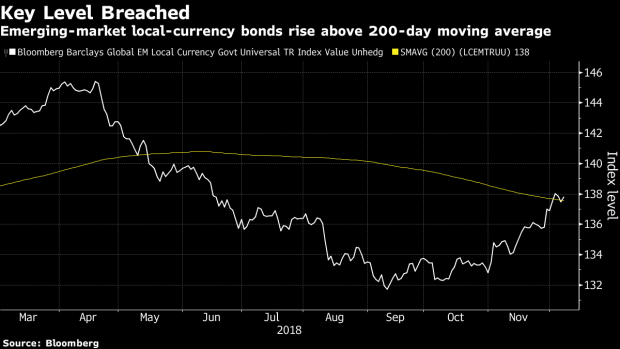Dec 9, 2018
Trade and Fed Noise Gives EM Central Banks License to Do Nothing
, Bloomberg News

(Bloomberg) -- The prospect of a string of interest-rate decisions in key emerging markets would have had traders on tenterhooks a few months ago.
Not so much these days. Central banks from Russia to Turkey and the Philippines all look likely to stay in wait-and-see mode this week as softening expectations for Federal Reserve rate hikes buoy developing-nation currencies by keeping the dollar and U.S. yields in check.
“We have been defensively positioned in EM for most of 2018, however in recent months valuations have become increasingly compelling,” said Paul Greer, a London-based money manager at Fidelity International. “EM now offers enough risk premium to compensate for the still considerable challenges going into 2019.”
Stocks will remain a pain point though amid trade-war rumbles and growing talk of a U.S. economic slowdown.
Turkey Volatility
- Turkey’s central bank on Thursday is set to hold its repo rate at 24 percent for a second month. Data due Monday will probably show that the nation’s economic expansion slowed to 2.2 percent in the third quarter, less than half of its rate in the previous three months. Turkey will unveil its current-account balance on Tuesday
- “If oil prices stay low that should continue to take pressure off the inflation and balance of payments outlook,” Goldman Sachs Group Inc. strategists including New York-based Zach Pandl wrote in a report. “But as the economy struggles and the rally in TRY grows longer in the tooth, it will be harder for it to stay disconnected from global factors, and we expect more two-sided volatility”
- The lira’s one-week implied volatility last week jumped the most since the height of the summer’s currency rout
Tightening Risks
- While the majority of economists expect Russian policy makers to keep their benchmark rate at 7.5 percent, Barclays Capital predicted that accelerating inflation, sanctions risks and a less-favorable environment in emerging markets will prompt the central bank to hike on Friday and once more in the first quarter
- Brazil is widely expected to hold its benchmark rate at a record low on Wednesday, and may be in no rush to hike next year after consumer prices fell more than all forecasts in November. The real was among the quarter’s top performers among major currencies as investors took heart in the victory by far-right President Jair Bolsonaro
- Peru’s central bank is also likely to keep borrowing costs unchanged on Thursday, marking the ninth month on hold
Philippine Pause
- The Philippine central bank could pause its tightening cycle on Thursday after inflation in November eased from a nine-year high. Given that monetary policy is firmly tied to inflation outlook, Nomura Holdings Inc. sees the overnight borrowing rate at 4.75 percent for at least a year, Euben Paracuelles, an economist wrote in a note
- The peso is the best-performing emerging-market currency in the second half of 2018
Mexican Budget
- Mexican President Andres Manuel Lopez Obrador must send his 2019 budget to Congress by Dec. 15. While most observers expect a primary budget surplus -- Finance Minister Carlos Urzua says it will be 1 percent -- more attention will be paid to assumptions underlying it
- Since Lopez Obrador has already rolled out an ambitious spending plan, including a Mayan train and new oil refinery, the budget represents the first chance for investors to understand how he’ll pay for it. The peso has fallen since a late October decision by Lopez Obrador to cancel a $13 billion airport that he criticized as too costly and ridden by graft
- “This will be crucial for setting the tone on Mexican assets into year-end and early 2019,” said Fidelity International’s Greer
India’s Election Gauge
- Indian markets will brace for a spike in political uncertainty as the results of five state elections will start flooding in on Tuesday. The outcome will be a gauge of sentiment in the run-up to general elections scheduled for May 2019
- It’s hard to predict how the vote next year will turn out, Prakash Sakpal, an economist at ING Groep NV, wrote in a note. “For now, the safe bet is that investors will stay clear of this market until political anxiety disappears, which is unlikely before mid-2019”
Key Data
- Investors will be keeping an eye on Chinese economic data for signs of impact from the trade war. Retail sales, fixed-asset investment and industrial production will be released on Friday
- Consumer price data due for release in Argentina on Thursday are expected to show inflation is decelerating. That would be a welcome break after the central bank hiked interest rates to world-beating levels to prop up the faltering peso
Click here for upcoming economic and data releases in Asia, here for Eastern Europe, here for the Middle East and Africa and here for Russia. And click here for Latin American data.
--With assistance from Alec D.B. McCabe.
To contact the reporters on this story: Netty Ismail in Dubai at nismail3@bloomberg.net;Justin Villamil in Mexico City at jvillamil18@bloomberg.net;Lilian Karunungan in Singapore at lkarunungan@bloomberg.net;Robert Brand in Cape Town at rbrand9@bloomberg.net
To contact the editors responsible for this story: Dana El Baltaji at delbaltaji@bloomberg.net, Stephen Kirkland
©2018 Bloomberg L.P.


